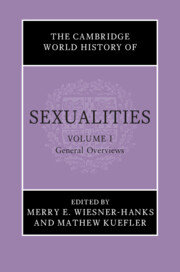Book contents
- The Cambridge World History of Sexualities
- The Cambridge World History of Sexualities
- The Cambridge World History of Sexualities
- Copyright page
- Contents
- Figures in Volume I
- Contributors to Volume I
- Editors’ Preface to the Series
- 1 The History of the History of Sexuality
- 2 The History of Sexuality and Anthropology
- 3 The History of Sexuality and Women’s History
- 4 The History of Sexuality and LGBTQ+ History
- 5 The Impact of Sigmund Freud on the History of Sexuality
- 6 Michel Foucault’s Influence on the History of Sexuality
- 7 Queer Theory and the History of Sexuality
- 8 The Sexual Body in History
- 9 Marriage and Families in the History of Sexuality
- 10 Class in the History of Sexuality
- 11 Sexuality and Race: Representations, Regulations, and Sentiments
- 12 Male Homoerotic Relations in History
- 13 Desire, Love, and Sex between Women in Global History
- 14 Trans and Gender Variant Sexualities in History
- 15 The Sale of Sex in History
- 16 Sexual Violence in History
- 17 Sexual Science in History
- 18 Sexuality and Emotion
- 19 Erotic Art in World History
- 20 Erotic Literature in History
- 21 The Material Culture of the History of Sexuality
- 22 Public History and Sexuality
- Index
- CONTENTS TO VOLUMES II, III, AND IV
- References
17 - Sexual Science in History
Published online by Cambridge University Press: 26 April 2024
- The Cambridge World History of Sexualities
- The Cambridge World History of Sexualities
- The Cambridge World History of Sexualities
- Copyright page
- Contents
- Figures in Volume I
- Contributors to Volume I
- Editors’ Preface to the Series
- 1 The History of the History of Sexuality
- 2 The History of Sexuality and Anthropology
- 3 The History of Sexuality and Women’s History
- 4 The History of Sexuality and LGBTQ+ History
- 5 The Impact of Sigmund Freud on the History of Sexuality
- 6 Michel Foucault’s Influence on the History of Sexuality
- 7 Queer Theory and the History of Sexuality
- 8 The Sexual Body in History
- 9 Marriage and Families in the History of Sexuality
- 10 Class in the History of Sexuality
- 11 Sexuality and Race: Representations, Regulations, and Sentiments
- 12 Male Homoerotic Relations in History
- 13 Desire, Love, and Sex between Women in Global History
- 14 Trans and Gender Variant Sexualities in History
- 15 The Sale of Sex in History
- 16 Sexual Violence in History
- 17 Sexual Science in History
- 18 Sexuality and Emotion
- 19 Erotic Art in World History
- 20 Erotic Literature in History
- 21 The Material Culture of the History of Sexuality
- 22 Public History and Sexuality
- Index
- CONTENTS TO VOLUMES II, III, AND IV
- References
Summary
Sexual science constitutes the empirical study of sexual function and behavior in living beings. It originated from natural philosophy and is now characterized by the methods and aims of modern science. This chapter treats the main story of sexual science, starting with conceptual concerns over the body and using examples from Chinese and Islamic medicine. Next, the analysis shifts to the foundations of sexual science in the Western world, examining philosophical and medical traditions that culminated in medieval scholasticism and institutions like universities and hospitals. The chapter then treats the Scientific Revolution and the Enlightenment, in which contemporaries invented the “two-sex” model and pioneered new ideas of “biopolitics.” The analysis turns the nineteenth century’s complex “discovery” of sex and the powerful connections between global imperialism and sexual understanding. The chapter concludes with the dynamics surrounding the body and sexuality in the global twentieth century, as found in evolutionary biology, sexology, and psychoanalysis, and the relation between mass culture and ideals of the sexual revolution. Sexual science appears paradoxical: sometimes, it seemed an agent of discipline and power, supporting entrenched values, or it seemed to help emancipate individuals, debunking prejudices and superstitions and liberating attitudes and behaviors.
Keywords
- Type
- Chapter
- Information
- The Cambridge World History of Sexualities , pp. 362 - 387Publisher: Cambridge University PressPrint publication year: 2024

